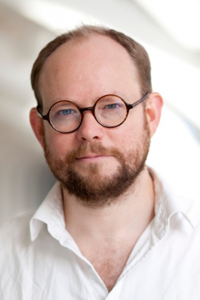
Ben Houge
Position
Professor
Affiliated Departments
Telephone
617-747-6233
Personal Websites
For media inquiries, please contact Media Relations
Career Highlights
- Video game audio development since 1996, including seven years at Sierra and four years at Ubisoft; currently at Bungie.
- Composed the string quartet soundtrack for the cult role-playing game Arcanum (2001), served as audio director for Tom Clancy’s EndWar (2008), and developed audio for many other game projects including Destiny 2, Half-Life: Opposing Force, Leisure Suit Larry 7: Love for Sail, and King’s Quest: Mask of Eternity.
- Developed an ongoing series of food operas, multisensory dining experiences that apply video game techniques in restaurants to provide an immersive, real-time soundtrack to a meal; collaborators include Andoni Luis Aduriz (Mugaritz), Tracy Chang (Pagu), Jason Bond (Bondir, Cambridge), Jozef Youssef (Kitchen Theory, London), Janice Wang (Crossmodal Research Laboratory, Oxford), Zeitgeist music ensemble, and the Boston Symphony Orchestra.
- Composed "The Tomb of the Grammarian Lysias," a setting of a poem by Constantine P. Cavafy that presents an innovative approach to using audience mobile devices as a crowd-diffused speaker array, with performances in Athens, Paris, Beijing, Kingston, Vancouver, and Boston.
- Composed a real-time score for U.K.-based dance group New Movement Collective's "Please Be Seated," performed at La Rambleta in Valencia, Spain, and Southbank Centre in London.
- Lectures widely, including presentations at the Game Developers Conference (San Francisco in 2016, Shanghai in 2014), the International Symposium on Electronic Art, the Web Audio Conference, the International Computer Music Conference, and the Oxford Symposium on Food and Cookery, in addition to institutions such as Harvard University, Massachusetts Institute of Technology (MIT), the Shanghai Conservatory, and the University of Hong Kong, as well as at leading restaurants including the Fat Duck and Mugaritz.
- Active in the Chinese music scene from 2004 to 2010; performed with Yan Jun, Wang Changcun, Elliot Sharp, Safety Scissors, Torturing Nurse, Dajuin Yao, Nosaj Thing, and Owl City.
- Digital art exhibited internationally: "Transportation Is Getting a New Look" (OV Gallery, Shanghai), "Study for Insomnia" (Art+Shanghai Gallery, Shanghai), "Kaleidoscope Wallpaper" (Today Art Museum, Beijing), "Self-Portrait, Dusk, at the Point of Departure" (True Color Museum, Suzhou), "Mobile 4" (San Diego Museum of Art), "Landscape with Water and Woodblocks" (Museum of Fine Arts, Valencia), and "Shanghai Traces" (Boston Cyberarts Festival, shortlisted for the Guggenheim’s YouTube Play biennial of creative video).
Awards
- Faculty-Led Innovations in Education (FLY) Grant (2019)
- Berklee Newbury Comics Faculty Fellowship (2017)
- Knight Foundation Grant (2015)
- Artist Residency at Spring Workshop, Hong Kong (2012)
- Artist Residency at MIT (2011)
- Shortlist for YouTube Play Biennial at the Guggenheim (2010)
- Artist Residency at True Color Museum, Suzhou (2010)
- Stranger Genius Award (2004)
Education
-
School NameSt. Olaf CollegeState or ProvinceMinnesotaDegreeBachelor of Arts (B.A.)Field of StudyMusicDate Degree Received
In Their Own Words
